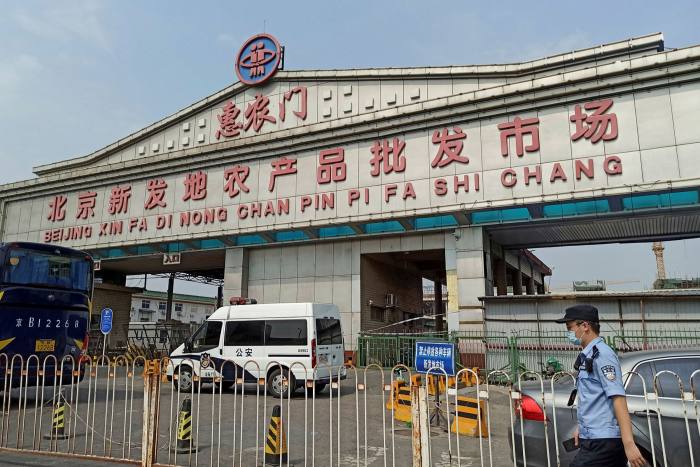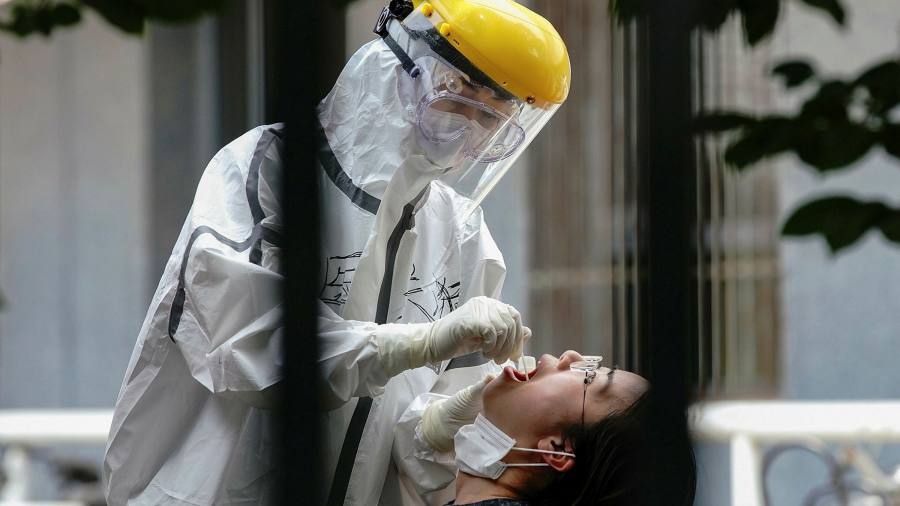China’s leaders have been fighting coronavirus from behind Beijing’s walls for months.
Authorities have spared no expense to keep the capital city of 20m safe from contagion — even going as far as diverting overseas flights to neighbouring cities to avoid imported cases on their turf.
But an outbreak within Beijing has shattered the capital’s sense of calm. Officials said on Wednesday that 31 new cases had been detected on Tuesday, in addition to the 106 infections that had appeared in the city since Friday. Schools have been closed and some transport links with other areas have been severed.
The new cluster of coronavirus cases has put Beijing on a “wartime” footing and reinvigorated efforts to stop the spread of the disease across the city and beyond.
The health scare has also raised the economic and political pressure on the Communist party — not in distant provinces but on its doorstep.
Zhou Xun, a reader in modern history at the University of Essex and a specialist on health intervention under the Communist party, said officials may lock down other cities suffering outbreaks, as they did last month in the north-eastern Chinese city of Shulan.
But a full lockdown of the capital city, home to the country’s senior leadership, is out of the question given its political symbolism.
“Beijing is different,” Prof Zhou said. “Being is the political centre of the People’s Republic of China. Any mishap in Beijing would damage the Communist party’s political image globally.”
Prof Zhou added: “A new outbreak, even though it’s relatively minor compared to the earlier one in Wuhan, would challenge the narrative of ‘success’ and present a real test politically.”
Chinese social media users were quick to point out that, despite a serious new cluster of cases, Beijing authorities have not locked down the whole city. The phrase “Beijing lockdown” was widely shared on Chinese microblogging site Weibo on Tuesday.
“It’s ok to lockdown Wuhan . . . it’s ok to lockdown Shulan — why is Beijing unlockable? Is it that it has some kind of special rights?” a Weibo user with the screen name Liwupu asked. Another user called Gundongdeqiu said the situation “was simply unfair . . . A Chinese characteristic”.
The new cases have been traced to Xinfadi, Beijing’s largest seafood and vegetable market, which supplies most of the city’s fresh produce. As one of the largest markets in the region, the decision to shut Xinfadi is expected to have a significant effect on the supply of food to northern China.

Schools in the western district of Fengtai, where the Xinfadi market is located, have delayed reopening and several residential compounds with confirmed cases have been locked down. People suspected of having come into contact with infected individuals have been asked not to leave Beijing and some transportation routes to other provinces have been halted.
The latest crisis is also drawing unwanted attention to some of the capital’s deficiencies.
About 75,000 people were tested for coronavirus on Sunday but by Tuesday morning public hospitals had been overwhelmed by residents demanding tests.
At some hospitals, long queues had formed — something that will embarrass party leaders — while people making appointments in public hospitals were told they should wait four days for the test.

The breaching of Beijing will raise concerns over economic stability, too.
“The latest virus outbreak in Beijing complicates the outlook further,” said Yu Song, chief China economist at Goldman Sachs. He noted that local authorities have taken swift action to bring the situation under control.
“But these actions come at an economic cost and, maybe more importantly, people’s sentiment has likely been affected.”
China is recovering from its most severe collapse in economic growth in recent memory. Retail sales growth has shown a considerable recovery from one of its largest contractions on record. In May, growth in retail sales was down just 2.8 per cent compared with the same time last year, a significant improvement on a month earlier. Data released on Monday showed that shoppers were buying more home appliances and cars than they were a year ago.
But economists now worry that optimism among average Chinese consumers could be damaged by the Beijing outbreak.
“All told, while a sudden economic stop due to new infections is unlikely, the growth prospects have unfortunately turned gloomier due to recent virus dynamics,” said Zhou Hao, senior emerging markets economist at Commerzbank. “Therefore, it again means a V-shaped recovery remains a distant scenario.”
Responsibility for cleaning up Beijing’s outbreak has fallen to Cai Qi, the capital’s party boss and a protégé of Chinese president Xi Jinping.
Mr Cai is one of many party cadres who has advanced rapidly to high-profile national positions after working with Mr Xi when the future president was a senior official in Zhejiang and Fujian provinces.
Jiang Chaoliang, the former party secretary of Hubei province, was sacked in February for the outbreak there, although he was not one of the president’s longtime allies. A series of other officials who have presided over virus clusters have also been sacked.
Mr Cai risks suffering a similar fate if Beijing’s status as a fortress is not quickly restored.
Additional reporting by Tom Mitchell in Singapore, Xinning Liu in Beijing and Qianer Liu in Shenzhen

